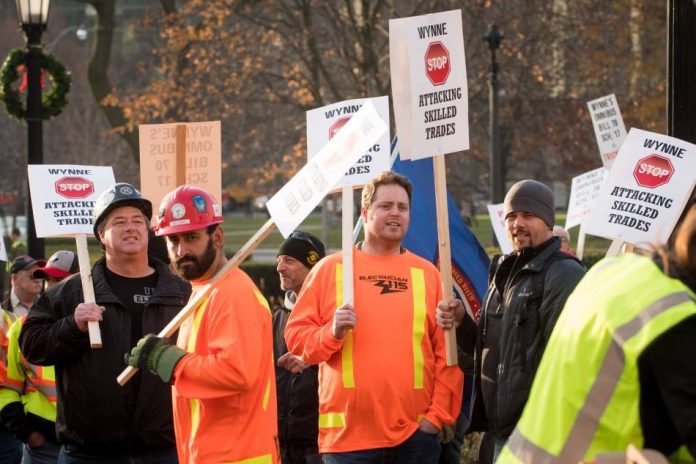
Ontario’s unionized construction sector has clashed with a Queens Park demonstration and competing news releases after the provincial government took action to implement one of the major Tony Dean Report recommendations about the Ontario College of Trades (OCOT) – switching scopes of practice issues to the Ministry of Labour (MOL), with appeals to be heard by the Ontario Labour Relations Board (OLRB) instead of a justice of the peace.
An estimated 4,000 workers protested at Queens Park on Nov. 30 about the implementing legislation, Bill 70, which the government introduced on Nov. 23. The protest was organized by the Progressive Certified Trades Coalition (PCTC), representing electrical contractors and workers, the pipe trades, sheet metal contractors and workers, roofers and automatic sprinkler contractors and fitters, among other trades.
However, not everyone in the construction organized labour movement agrees.
The protest against changes in rules governing skilled trades workers does not have the support of a significant number of unions in Ontario’s construction trades, the Coalition of Non-Compulsory Construction Trades of Ontario said in its own announcement. Later, the Labourers International Union of North America (LIUNA) joined the opposition with its own statement.
The coalition represents seven major construction unions whose members were affected by a freeze on certifications several years ago. Schedule 17 of Bill 70, the law at the centre of yesterday’s protest, opens the certification process again to these trades.
“The reason certain trades oppose Bill 70 is that they will no longer be able to use the Ontario College of Trades as a vehicle to displace workers who belong to the non-compulsory trades,” said Joseph Maloney, international vice-president for Canada of the Boilermakers union.
The trades represented in the coalition are the Boilermakers, Bricklayers and Allied Crafts, Carpenters, Heat and Frost Insulators, Ironworkers, Millwrights and Painters and Allied Trades.
“Every trade trains its members to the highest standards,” Maloney said in a statement. “They are all skilled workers, for whom safety is paramount,” said Maloney. “For the certified trades to say the other trades are unsafe is not only untrue, but is fear mongering at its finest.”
“The amendments put forward by the government will rectify years of discrimination against these trades,” he said. “All we are asking is that our members, who are every bit as skilled as the certified trades, have the same chance to work as everyone else.”
The changes have been discussed through two years of consultation. There have been two reports on the matter, one by Tony Dean in 2015 and a review of the Dean Report by former MPP Chris Bentley earlier this year.
“There have been two years of delays in implementing these changes,” Maloney said. “It’s time to move forward. ”
Along with the non-certified trades, the labourers union had expressed support for the changes, after (in the early days of the OCOT), labourers discovered themselves in jurisdictional conflicts with certified trades, with complaints interfering with what the labourers consider to be long-standing site practices..
“Although we may have different interests, we share a very strong consensus with the most important aspects of this Bill,” said LIUNA international vice-president Joseph Mancinelli.
The proposed changes contained in Schedule 17 are the result of not one, but two in-depth and independent reviews conducted by Senator Tony Dean (former Secretary of Cabinet and Deputy Minister of Labour) and Chris Bentley, a former Minster of Labour and Attorney General. “It’s time to move forward,” noted Maloney.
James Hogarth, business manager of the Ontario Pipe Trades Council, said in a published report that the OLRB would make decisions not based solely on scopes of practice requirements, but include other considerations including OLRB jurisprudence on union disputes and new guidelines including “risk of harm” — which can mean different things to different people.
“Scopes of practice has to be number one,” Hogarth said in the report. “The Ontario College of Trades has to be what you look at. Don’t look at other irrelevant factors that someone who doesn’t know the industry takes into account.”
Labour minister Kevin Flynn has indicated he rejects the certified trades’ arguments. “Their concerns are unfounded,” Flynn was quoted as saying. “It’s my own personal opinion as the minister of labour that they are getting some very bad advice on this matter.”
There are possible changes to the legislation, part of a general budget omnibus bill, it moves to Standing Committee of Finance and Economic Affairs.
